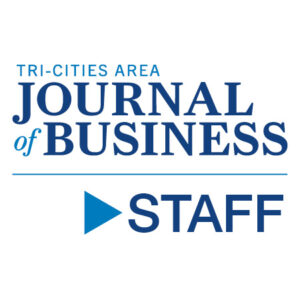
Home » Q&A with Bob Schuetz
Q&A with Bob Schuetz

December 14, 2021
Bob Schuetz
CEO
Energy Northwest

Number of employees you oversee: 1,000 +
Brief background of your organization:
Energy Northwest is a joint operating agency of Washington state, comprised of 27 public power member utilities from across the state, serving more than 1.5 million customers.
Energy Northwest owns and operates a diverse mix of 100% carbon-free electricity generating resources including hydro, solar, battery storage and wind projects and the third-largest provider of electricity in Washington – the Columbia Generating Station nuclear power facility.
The agency continually explores new generation projects to meet its members’ needs.
How did you land your current role? You are new in the position. What is your message to the organization and the community about your priorities?
I was in the right place at the right time for many steps along my career.
But at each step, my priorities have been: Strive for excellence in all that you do; remember that everyone you meet might be in a position to help you in the future; and do everything you can to make your crew/team/peers individually successful.
I came to Energy Northwest as the maintenance manager for Columbia Generating Station in 2013 and held various leadership roles including plant general manager and site vice president.
I became CEO in August 2021.
I’m also a 28-year Navy submarine veteran. I had the honor to command the fast attack submarine USS Hyman G Rickover (SSN 709) and Submarine Squadron Seventeen at the Bangor submarine base in Kitsap County.
I retired from service as the deputy commander and chief of staff for the U.S. Pacific Fleet Submarine Force. Most everything I learned about leadership I learned from my Navy experiences.
What role is Energy Northwest playing to meet climate change goals?
In addition to safe, reliable and cost-effective operation of our current clean energy generating assets, Energy Northwest is looking to assist our member utilities in meeting the 2045 goal by expanding the clean power we can offer our members.
The recent commissioning of the Horn Rapids Solar and Battery Storage project, initial stages of development for a 155MWe Ruby Flats solar project and the expansion of electric vehicle charging stations in the state through our EVITA project are some of the strides we’re making.
Why should the Tri-Cities care about Energy Northwest and its role in our community?
I think most everyone would agree that humans are having some impact on our climate. As a provider of 100% carbon-free electricity, we will play an important role to help Washington achieve 100% carbon-free, clean power by 2045.
What is one characteristic that you believe every leader should possess?
Humility.
What is the biggest challenge facing business owners/managers today?
On any day, I would say cost-efficient operation of your business to make sure you can attract customers.
In the current climate it is starting to become more difficult to attract and retain the talent we need to be successful. There needs to be a never-ending focus on workforce development – starting as early as elementary and secondary schools.
Finally, the challenges posed by Covid-19 and vaccine mandates have the potential to exacerbate the workforce planning and development issues.
If you had a magic wand, what would you change about your industry/field?
I would educate the public on what nuclear power is and what it’s not.
Nuclear power is clean, safe, responsible electricity. It provides more than half of America’s carbon-free electricity, it’s full time, and doesn’t create huge volumes of radioactive waste. We also get confused with the cleanup efforts at the U.S. Department of Energy’s Hanford site. We’re neighbors, but our mission and purpose are very different.
What advice would you give someone going into a leadership position for the first time?
Treat everyone as you would want to be treated; the small things really do matter; make sure you take the time to understand your own strengths and weaknesses; end every sentence with a question mark; and always be the last to speak.
Who are your role models or mentors?
In my career I have had dozens of mentors, but one from the Navy and one from the nuclear industry who have been invaluable to my development over the years. Both very rarely tell me what it is I need to do to solve a problem or capitalize on an opportunity, but rather they have a knack for knowing the right questions to ask and will guide me to coming up with my own solution to a problem.
Make it possible for them to be successful with the knowledge, skills, tools, resources and oversight they need. Listen – then talk. Celebrate success. When corrections and improvements are necessary, be fair. Communicate the ‘what’ and ‘why.’
Finally, get out of their way!
How did you decide to pursue the career that you are working in today?
It is a long story, but it came down to basic hard work, networking and timing.
I didn’t plan on a career in the Navy or becoming a CEO. It started with needing Navy ROTC to fund my college education, Navy training around a nuclear-powered aircraft carrier and switching my studies to nuclear engineering.
After initial nuclear training, I asked for an assignment on an operating attack submarine on the west coast, but got an overhaul missile submarine on the east coast. At least that was where I met my wife.
I had always planned to leave the Navy after my ROTC commitment was over, but at that point I had a young wife, a tiny baby and it seemed a bad time to transition. Follow-on assignments led to upward mobility in the Navy.
When I retired from the Navy, I transitioned to inspecting civilian nuclear power plants and then landed a leadership position at Columbia. Ten years later I was honored with a promotion to CEO.
How do you measure success in your workplace?
The nuclear industry measures itself constantly, with monthly performance indicators where we compare ourselves to our industry peers. We are regulated by many different agencies, including the Nuclear Regulatory Commission, which gives us an annual performance report.
But perhaps the best indicator is our annual employee engagement survey – if our employees are happy coming to work and feel empowered, everything else will fall into place.
What do you consider your leadership style to be?
Facilitative/intent based.
How do you balance work and family life?
I try to carve out dedicated time for my wife and family, and I have several things we do together.
I use up my personal time. On weekends I get up at my regular wake up time and work in my home office until my wife gets up, then try and devote the rest of the day to family. I also have an end of the day personal reflection routine where I ask myself five questions about my day.
One of those questions is, “What did I do for my family today?” It might just be a phone call to one of my daughters on the way home, or a quick text to my wife that I’m thinking of her – but the question keeps me honest every day.
What do you like to do when you are not at work?
I enjoy reading and always have a book in progress.
I try and alternate between leadership/self-improvement and something fun.
Right now I’m reading “Barbarians at the Gate: The Fall of RJR Nabisco.” I enjoy hiking and biking. I’ve made two attempts at Mt. Rainier, and recently bought eBikes with my wife and have over 1,500 miles on it.
Fairly recently we’ve taken up RVing. I love to sail, but don’t have a boat – fortunately my son-in-law in San Diego does! I also work out at Orangetheory Fitness about three days a week.
What’s your best time management strategy?
I am a dedicated practitioner of David Allen’s “Getting Things Done.” The outward indicator of that is I leave work every day with an empty inbox.
Best tip to relieve stress?
Exercise in any form (hiking, biking or the gym).
What’s your favorite podcast? Most-used app? Or favorite website? Favorite book?
Book: Ian W. Toll’s “Six Frigates: The Epic History of the Founding of the U.S. Navy”
Book: Patrick O’Brien’s Aubrey-Maturin series
Book: “Getting Things Done,” by David Allen
Favorite Podcast: “This American Life”
Most Used App: Newsreader
Do you have a personal mantra, phrase or quote you like to use?
Don’t mistake activity for progress.
Q&A Local News Energy
KEYWORDS december 2021





